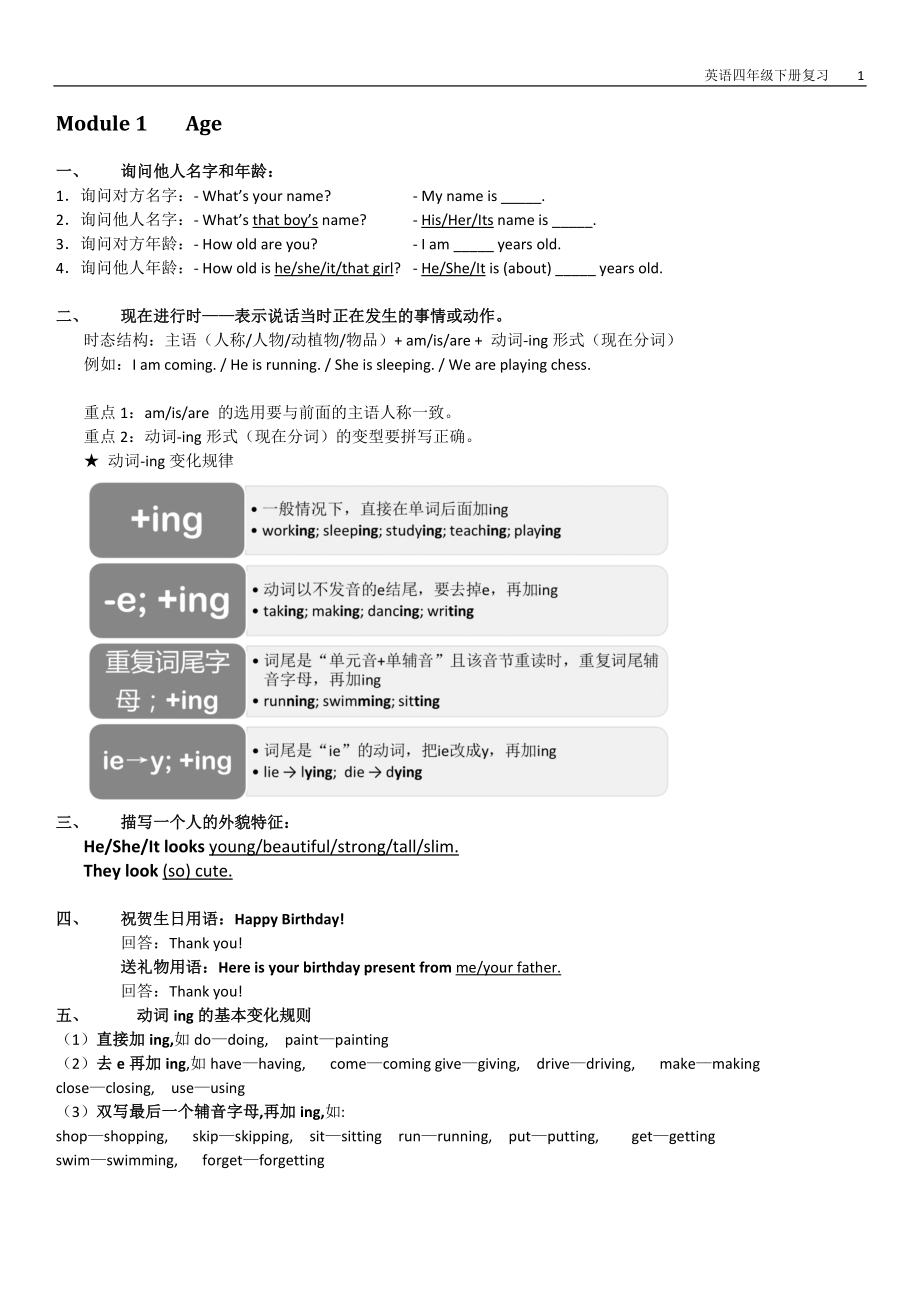 广州版小学英语四年级下册复习要点及练习
广州版小学英语四年级下册复习要点及练习



《广州版小学英语四年级下册复习要点及练习》由会员分享,可在线阅读,更多相关《广州版小学英语四年级下册复习要点及练习(11页珍藏版)》请在装配图网上搜索。
1、英语四年级下册复习 11Module 1Age一、 询问他人名字和年龄:1询问对方名字:- Whats your name?- My name is _.2询问他人名字:- Whats that boys name?- His/Her/Its name is _.3询问对方年龄:- How old are you?- I am _ years old.4询问他人年龄:- How old is he/she/it/that girl?- He/She/It is (about) _ years old.二、 现在进行时表示说话当时正在发生的事情或动作。时态结构:主语(人称/人物/动植物/物品)+
2、 am/is/are + 动词-ing形式(现在分词)例如:I am coming. / He is running. / She is sleeping. / We are playing chess.重点1:am/is/are 的选用要与前面的主语人称一致。重点2:动词-ing形式(现在分词)的变型要拼写正确。 动词-ing变化规律三、 描写一个人的外貌特征:He/She/It looks young/beautiful/strong/tall/slim.They look (so) cute.四、 祝贺生日用语:Happy Birthday!回答:Thank you!送礼物用语:Here
3、 is your birthday present from me/your father.回答:Thank you!五、 动词ing的基本变化规则(1)直接加ing,如dodoing, paintpainting(2)去e再加ing,如havehaving, comecoming givegiving, drivedriving, makemakingcloseclosing, useusing(3)双写最后一个辅音字母,再加ing,如:shopshopping, skipskipping, sitsitting runrunning, putputting, getgettingswims
4、wimming, forgetforgettingModule 2Activities一 询问他人正在做什么事: 回答用正在进行时问:What are you doing?What is he/she doing?What are they doing?答:I am listening to the music.He/She is playing guitar.They are playing basketball.复习现在进行时的时态,结构:am/are/is+动词ing。 表示形式一般有以上三句口诀:三个朋友不分离,缺了一个出问题,I与am,you与are, is搭配他,她,它,(he,s
5、he,it)二 动词play后面加名词的情况:1 play + 名词:play chess / music / basketball / football / table tennis / badminton2 play + the + 乐器:play the guitar / piano三 告诉他人你喜爱的活动,用like/enjoy + 现在分词(动词-ing形式)如:I like swimming.I enjoy playing chess with my father.四 询问他人是否喜爱某项活动,用Do you like + 现在分词(动词-ing形式)?问:Do you like
6、listening to the music?/ Does your mother like cooking?答:Yes, I do. / No, I dont./ Yes, she does. / No, she doesnt.五 询问他人喜爱做的事情是什么,用 What is your hobby?问:What is your hobby? (你的爱好是什么?)答:I like watching TV.六 询问数量的时候,无论对方回答的情况有多少,都要用复数问:问:How many apples are there?答:Theres one.How many cookies are the
7、re?There are twenty.How many buns are there?There is none. (一个都没有了。)七 询问他人或某物在哪里:问:Where are they?答:They are in the classroom.Where is the book?Its on the bookshelf.八 询问某人是否正在/是否仍在做某事:问:Are you cooking dinner?答:Yes, I am. / No, I am not.Are you still reading the book?Yes, _. / No, _.Are they still w
8、atching TV?Yes, _. / No, _.Is he still sleeping?Yes, _. / No, _.Is she singing?Yes, _. / No, _.Is it running in the garden?Yes, _. / No, _. 练习:写出下列单词的现在分词(即动词-ing形式)lookskiphavesinggardenwatchtellrunweargivejokeblowcuteatdoplayfishlistenreadcookdancemakeswimpaintwavefallweight-liftgetcatchjump 练习:写出
9、下列中文对应的单词、词组或短句。在钓鱼在看电视在听音乐在看书在跳舞在煮东西在下棋在弹吉他在做模型船在打乒乓球在踢足球在玩电脑游戏在画画在唱歌在游泳在电脑上工作在湖里在海里在花园里在操场上在课室里在公园里好的。没问题。玩得开心。那你呢?在外面那很好。音乐很不错。你还在那里吗?晚餐还没有准备好。轮到你了。那就对了。Module 3Sports一 实用短语:fall overacross the fieldgo for itcatch upa setter of a world record1)世界纪录创造者:2)为努力:3)赶上来了:4)跌倒了:5)穿过场地/田野:注意本模块中出现的短语和句子的中
10、文意思。学习后能否做到实际中运用它们?fall over跌倒了 across the field穿过场地/田野 go for it为.努力catch up赶上来了 a setter of a world record 世界记录创造者二 表达“某人擅长于什么”的句型结构:somebody(某人)be good at (doing) something(某事)例句:Tom is good at running.1) 他擅长游泳。2) 她擅长跳高。3) 他们擅长打篮球。4) 我爸爸擅长打羽毛球。5) 我擅长打乒乓球。例子: Im good at playing table tennis. Youre
11、 good at swimming. She/He/Tom is good is running. They/The athletes are good at swimming.三 根据中文意思,以正确的形式填入单词。1、 动词ing的使用要点:(1)进行事的使用要点,人称+am/are/is+动词ing形(doing),如I am watching TV./The children are play games./Janet is reading.(2)句子中有enjoy或like,紧跟后面的动词要用ing形式,如:I like swimming, They enjoy playing fo
12、otball。(3)be good at 短语后面的动词,要用ing形式,如:I am good at singing. We are good running. The cat is good at catch mice(老鼠)1) I _(喜欢看电视)2) My mother _(享受和她的朋友一起逛街)3) His father _ (擅长钓鱼。)4) Jack _(正在追赶上)Tom.5) Lucy _(正在很快地跑过操场)6) Her _(爱好是唱歌)7) The boys _(正在操场上踢足球)8) Kate _(正在她的房间里做作业)9) Listen, who _(在弹钢琴)1
13、0) My grandfather and grandmother _(喜欢打羽毛球)11) Andy _(擅长画猫)12) We _(擅长跳远和跳高)13) Betty _(喜欢跑步), but she _(跑得慢)14) Jim _(擅长打篮球), but he _(不擅长游泳)15) Do you _(喜欢下棋吗)四、你有注意本块模式一些有关激励、赞扬的句子吗?Thats great! Our Chinese team is great!Well done!Our team is the winner! Go!Go!Go for it. Module 4 Entertainment思考问
14、题1、你是否留意把一些娱乐场所和一些娱乐项目进行分类记忆呢?娱乐场 一般可以欣赏的项目cinema 电影院 film 电影 theater 剧院 play 戏剧show 展览 entertainment 娱乐2、你是否注意表达“某人喜欢什么的句子结构呢?I/you/we like sth./doing sth. He/She likes sth/doing sth.(1)like后跟动词ing形式.I like playing chess。You like eating ice-cream。We like listening to the radio every morning. They l
15、ike watch the news on TV.(2)like 后跟名词 I/You/We/They like English。 She/He/Tom likes toys。但要和“look、like”分清 3、请留意有关电视节目TV programme有不少的内容:TV plays/music programme/news/sports programme/cartoon4、你是如何评价这些娱乐节目的?你在平时交流中用下列的用语吗? (1)本单元出现的:What do you think(of)?Its boring. /Its great. /Its interesting./ Its
16、funny.1、 请注意,当你要表达自己的想法时,会使用这样的引导语吗?Im sure I think当要询问别人也有这样的想法时,就会用:Whats your idea? What about you?Whats wrong? Do you6、“打开”电器要用“turn on”,不能用“open”,如:turn on the TV turn on the radio turn on computer7、一般现在时的使用:1、定义:一般现在时表示已形成习惯、规律的动作或状态。2、特征:通常句子中有often、usually、或sometimes、on Monday等等。3、肯定句的结构:人称+
17、动词:其他人称(I、you、we、they、the boys)+动词原形第三人称单数(he、she、it、many)+动词“s”形式例句:The boys like TV plays. Sally likes TV plays.4、一般疑问句:助动词(Do/Does)+人称+动词原形Do the boys like TV plays?Does the boy like TV plays?5、否定句:人称+助动词否定形词(dont/doesnt)+动词原形The boys dont like TV plays.The boy doesnt like TV plays.6、记住:助动词一出,后面动
18、词用原形。Module 5 Food and Drink思考问题1、注意英文中名词的表达方法和形式。名词:可数名词(可以直接在前面用a、an来修饰) 不可数名词(不可以直接在前面用a、an来修饰)2、不可数名词结构:数量+量词+of+不可数名词,如:a piece of toast、a cup of tea、a bottle of orange juice、a bowl of rice、a plate of noodles、a cup of coffee、a bottle of milk、a glass of water如果要变成复数,就在量词末尾加“s”,如:two pieces of br
19、ead、five glasses of milk不可数名词除了上面的表达外,还可以:some tea/juice/coffee/rice /milk/toast/water记住不可以在不可数名词面前直接用a、an来修饰。3、你有否注意梳理下列询问和回答的形式?1)询问别人是否喜欢吃某些食物:Do you like/have some?2)更婉转的询问方式:Would you like/have some?3)回答方式:应允:Yes, please. /OK. /Yes, I do. /Thank you. /Thanks.拒绝:No, thanks. /Sorry, I dont like/h
20、ave4)询问别人想吃/喝什么:What do you like to eat/drink?What do you want for starters?应允:I like拒绝:No, thank you. / Thanks. No thing for me, thanks.4、有否观察到课文中来自不同国家的人所选择的食物,如:Sally/Mike likes pasta、hamburger、chips、saladJiamin/Xiaoling likes rice、Chinese cabbage、soup、porridge、noodles、dumplings5、“也”的不同表达方法:1)too
21、/also 用于肯定句 2)either 用于否定句肯定句:I like salad, I like soup too.I like salad, I like soup also.I like salad, I also like soup. (also可放句中或句尾)否定句:I dont like salad, my mother doesnt like salad either.Module 6 Shopping思考问题1、温故知新,询问价钱表示方式:How much is the? ItsHow much does thecost? Its costsHow much are the?
22、 They areHow much do thecost? They cost2、请注意一些价钱,斤两的短语:One dollar a kilo 2 dollars 60 cents a kilo half a kiloa kilo of apples two kilos of potatoes3、请注意顾客表示满意的表达方式:They look goodIt looks goodTheyre really freshIts really fresh4、表示不满意的表达方式:TheyreIts too smallbigThey lookIt looks not so good5、付款和找回零钱
23、的表示方法:A:Heres the money. (付款)B:Heres the change. (找会零钱)6、有否注意以“o”结尾后的一些单词的复数形式?一个有趣的现象可助你记忆:它们加了复数后的字母是偶然数分类:(1) potato-potatoes tomato-tomatoes (2) photo-photo radio-radios 注意:kilo-kilos7人民币的“元”和英镑的说法1-one yuan 20-twenty yuan(没有复数形式)&1-one pound &20-twenty pounds(有复数形式)$1- one dollar $20-twenty dol
24、lars (有复数形式)Module 57一 根据中文提示,写出相应的英文:一日三餐: three _ a day早餐:午餐:晚餐:饮料:咖啡:可乐:水:茶:苹果汁:橙汁:牛奶:汤:白菜汤:中餐:米饭:面条:米粉:炒饭:粥:饺子:馒头:点心:鸡蛋:猪肉:鸡肉:牛肉:西餐:开胃菜:主食:甜品:三明治:汉堡包:热狗:面包:吐司:牛排:意大利薄饼:意大利粉:炸薯条:巧克力:沙拉:冰激凌:蔬菜:胡萝卜:番茄:马铃薯:西兰花:白菜,卷心菜:洋葱:辣椒:蘑菇:水果:苹果:梨:香蕉:葡萄:桃子:草莓:橙:柠檬:西瓜:一片吐司:一碗米饭:一瓶牛奶:一杯茶:一碟炒饭:一杯水:一公斤鸡蛋:一盒薯条:二 饮食用语1
25、) 问:What would you like for breakfast / lunch / dinner / supper?答:Id like some milk and bread for breakfast. 造句:_ for lunch._ for dinner._ for starter._ for main course._ for dessert.2) 问:What do you usually have for breakfast / lunch / dinner / supper?答:I usually have rice, fish and cabbages for di
26、nner.造句:_ for lunch._ for dinner._ for starter._ for main course._ for dessert.3) 问:Would you like some coffee?答:No, thanks. / Yes, thank you.4) 问:Do you like toast / sandwich / noodles?答:Yes, I do. / No, I dont.5) 表达自己或某人最喜欢什么:I like _ best.造句:(她最喜欢雪糕。)_(我爸爸最喜欢牛排。)_(我奶奶最喜欢蛋糕。)_(我妹妹最喜欢弹琴。)_(我们的语文老师最喜欢看书。)_6) 表达不喜欢什么:I dont like _. He/She/It doesnt like_ at all.造句:(我一点儿都不喜欢洋葱。)_(我妈妈不喜欢汉堡包。)_(我爷爷一点儿都不喜欢芝士。)_(他们不喜欢馒头。)_(我们不喜欢柠檬汁。)_
- 温馨提示:
1: 本站所有资源如无特殊说明,都需要本地电脑安装OFFICE2007和PDF阅读器。图纸软件为CAD,CAXA,PROE,UG,SolidWorks等.压缩文件请下载最新的WinRAR软件解压。
2: 本站的文档不包含任何第三方提供的附件图纸等,如果需要附件,请联系上传者。文件的所有权益归上传用户所有。
3.本站RAR压缩包中若带图纸,网页内容里面会有图纸预览,若没有图纸预览就没有图纸。
4. 未经权益所有人同意不得将文件中的内容挪作商业或盈利用途。
5. 装配图网仅提供信息存储空间,仅对用户上传内容的表现方式做保护处理,对用户上传分享的文档内容本身不做任何修改或编辑,并不能对任何下载内容负责。
6. 下载文件中如有侵权或不适当内容,请与我们联系,我们立即纠正。
7. 本站不保证下载资源的准确性、安全性和完整性, 同时也不承担用户因使用这些下载资源对自己和他人造成任何形式的伤害或损失。
